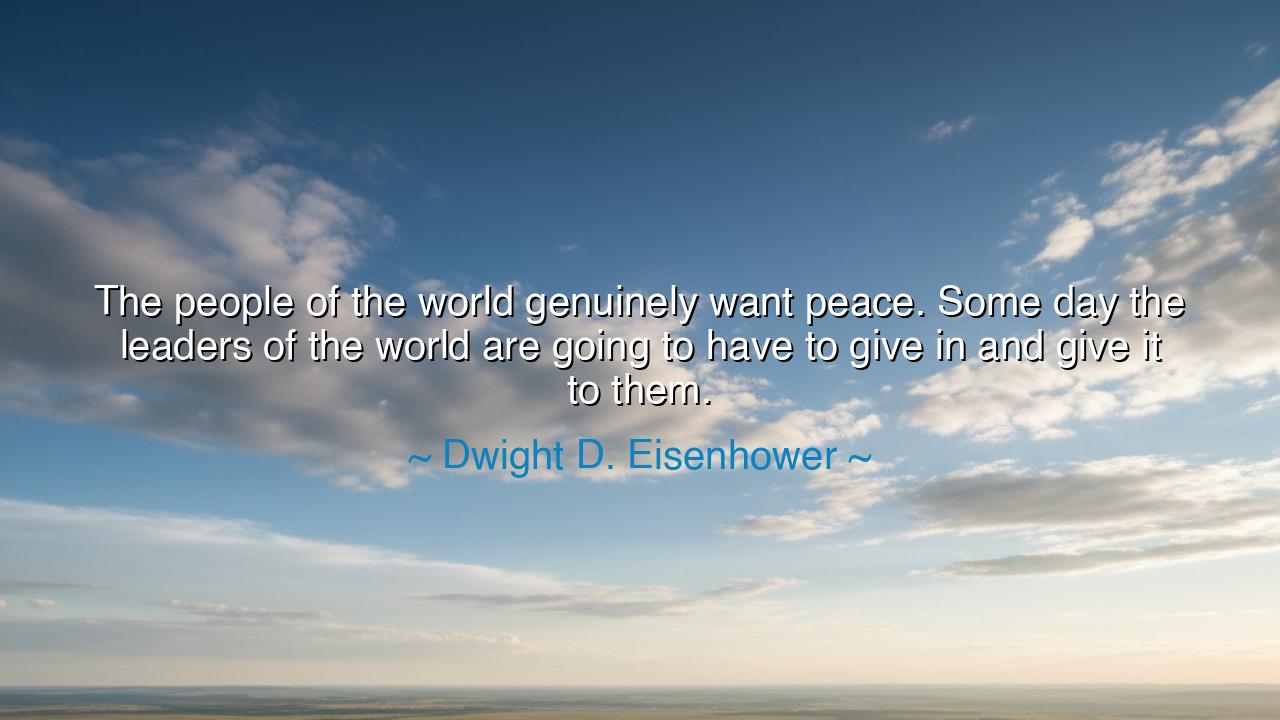
The people of the world genuinely want peace. Some day the
The people of the world genuinely want peace. Some day the leaders of the world are going to have to give in and give it to them.






Hear the words of Dwight D. Eisenhower, warrior turned statesman, who bore the weight of armies across continents and yet, when the clash of war was past, sought only the quiet fields of peace: “The people of the world genuinely want peace. Some day the leaders of the world are going to have to give in and give it to them.” These words rise not from naivety, but from the heart of one who had seen the cruelty of war, who had heard the thunder of guns and the cries of the fallen, and who knew that the deepest longing of humankind is not conquest but rest, not bloodshed but peace.
The meaning of this saying is clear: the common people—the farmers, the laborers, the mothers, the children—desire nothing more than to live in safety and dignity. It is not they who hunger for war; it is the mighty, the rulers, the ambitious, who ignite the flames of conflict for power or pride. Yet even leaders, though stubborn, cannot forever deny the cry of the masses. Eisenhower foresaw that the voice of the people, rising across nations, would one day force the rulers of men to yield and grant the blessing of peace.
History itself provides testimony. Recall the long torment of the Vietnam War. For years, leaders on both sides pressed forward with fire and steel, while the people—soldiers weary of killing, citizens weary of burying their sons—rose in protest. In America, in Europe, in Asia, voices cried out in the streets, demanding an end. And though it took time, the tide of the people’s will could not be silenced. Leaders who once thought themselves immovable were compelled to retreat, and the war ended—not because of victory on the battlefield, but because the people’s demand for peace grew too strong to be ignored.
This is the ancient truth: leaders may hold swords, but the people hold the soul of the world. Armies may march, but they march upon the backs of ordinary men and women. When the people unite in their yearning for peace, even kings must bow, for no throne can stand forever against the tide of humanity’s desire for life over death. Eisenhower, seasoned in both the arts of war and governance, knew that power is fleeting, but the will of the people endures.
O seekers, learn this well: peace is not given by decree—it is demanded by persistence. Do not wait idly for leaders to change their hearts. The rivers of peace are carved by the steady pressure of countless drops of water, not by the command of a single man. If you long for a world without war, then let your voice join the chorus of humanity. Be steadfast, for leaders will resist, but they cannot resist forever.
Reflect also in your daily life. You are not a ruler of nations, perhaps, but you are a leader in your home, in your work, in your circle of companions. Do you hear the desires of those entrusted to you? Do you grant them peace by your presence, or do you rule with pride and stubbornness? The lesson of Eisenhower is not only for the halls of power but for every heart that wields authority, however small: to ignore the will of those around you is to plant the seeds of rebellion; to heed it is to nurture harmony.
Thus the teaching stands: the people of the earth, in their essence, seek only peace, and one day even the proud must surrender to this truth. Let us hasten that day by living as peacemakers in our own spheres, by raising our voices against the engines of war, and by choosing kindness where cruelty tempts us. For when the many demand peace with one voice, the few who lead must finally lay down their arms.
So remember, O children of the future: the leaders of this world may hold the power of nations, but the people hold the power of destiny. And destiny whispers always the same: “Give us peace.”






AAdministratorAdministrator
Welcome, honored guests. Please leave a comment, we will respond soon